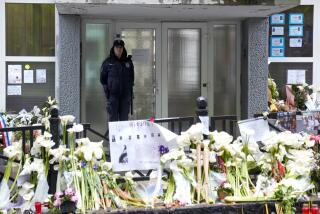Security Council Lifts Yugoslav Arms Embargo
UNITED NATIONS — The U.N. Security Council unanimously ended an arms embargo against Yugoslavia on Monday, stripping away the last of nearly a decade of international sanctions against the Balkan nation’s government.
The 15-nation council imposed the embargo in March 1998 to protest a crackdown on ethnic Albanians in the province of Kosovo by then-President Slobodan Milosevic. After Milosevic was ousted in October, the U.S. and European governments began to gradually lift sanctions against the country.
The new Yugoslav government of President Vojislav Kostunica fulfilled the last requirement to end the ban in June by transferring Milosevic to a U.N. war crimes tribunal in The Hague.
Some groups had urged that the ban remain to ensure that Yugoslavia would continue to cooperate in rounding up suspects wanted in Balkan war crimes cases. However, France and Russia have been pushing for months to end the embargo. Two weeks ago, the U.S. added its support.
The Security Council decision “reveals the good relations, the constructive cooperation and the trust which exist now between the democratic authorities in [the Yugoslav capital of] Belgrade and the international community,” the current president of the Security Council, French Ambassador Jean-David Levitte, said after the vote. “The development of this dialogue with Yugoslavia is very positive for the search for peace, stability and reconciliation in Southeast Europe.”
The move allows the Yugoslav armed forces to obtain military equipment from the international community.
The Yugoslav federation, which once consisted of six republics, has been reduced by a decade of war and secession to the republics of Serbia and Montenegro.
Kosovo is a province of Serbia but remains under U.N. administration since North Atlantic Treaty Organization forces drove out Milosevic’s military and police units in 1999.
In a letter delivered to the council last week, Secretary-General Kofi Annan listed steps Yugoslavia has taken to comply with U.N. requirements for the arms embargo’s removal, including the withdrawal of special police units and the halting of military and police activities against Kosovo’s civilians. Belgrade also has cooperated with human rights investigators and aid organizations, Annan noted.
On Sunday, Serbian authorities announced the latest discovery of a mass grave they believe contains the bodies of ethnic Albanians killed during the 1999 crackdown. Police said bodies and body parts of 26 unidentified people were exhumed a day earlier at the site near Lake Perucac, about 100 miles southwest of Belgrade.
Such investigations have encouraged U.N. officials that Yugoslavia’s new democratic government is sincere in working with the United Nations in pursuing peace and justice in the wake of the war.
“I think it is a very positive development, and I applaud the council for taking prompt action,” Annan said Monday after the vote.
The U.N. had blocked weapons sales in the first half of the 1990s to Yugoslavia, Croatia and Bosnia-Herzegovina, but it lifted the ban in increments after the signing of the 1995 Dayton, Ohio, peace accord that ended the Bosnian war.
The Security Council reimposed the embargo in 1998 after Yugoslavia’s attacks on the ethnic Albanian majority in Kosovo, acts that led to a 78-day air campaign by NATO against the nation. The 1998 resolution called on all states to stop supplying weapons to Yugoslavia, to encourage peace and stability in the region.
More to Read
Sign up for Essential California
The most important California stories and recommendations in your inbox every morning.
You may occasionally receive promotional content from the Los Angeles Times.










